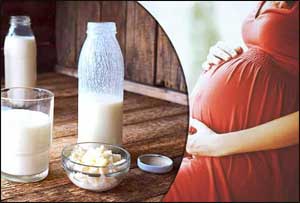- Home
- Editorial
- News
- Practice Guidelines
- Anesthesiology Guidelines
- Cancer Guidelines
- Cardiac Sciences Guidelines
- Critical Care Guidelines
- Dentistry Guidelines
- Dermatology Guidelines
- Diabetes and Endo Guidelines
- Diagnostics Guidelines
- ENT Guidelines
- Featured Practice Guidelines
- Gastroenterology Guidelines
- Geriatrics Guidelines
- Medicine Guidelines
- Nephrology Guidelines
- Neurosciences Guidelines
- Obs and Gynae Guidelines
- Ophthalmology Guidelines
- Orthopaedics Guidelines
- Paediatrics Guidelines
- Psychiatry Guidelines
- Pulmonology Guidelines
- Radiology Guidelines
- Surgery Guidelines
- Urology Guidelines
Women on Probiotic milk in early pregnancy have less complications during pregnancy

In a Scandinavian study, Researchers have found that Pregnant women drinking probiotic milk early in their pregnancies are less likely to have complications during pregnancy including premature births or pre-eclampsia. However these findings are only statistical observationsand are therefore not enough to start recommending probiotic consumption to pregnant women, said Nordqvist, a researcher at Sahlgrenska University Hospital in Gothenburg, Sweden.
Timing was everything, though, researchers found: Women who drank probiotic milk early in their pregnancies, but not those who only drank it before or late in pregnancy, were 21 percent less likely to give birth prematurely compared to others. For pre-eclampsia, a 20 percent risk reduction went along with drinking probiotic milk late in pregnancy, but not earlier in gestation or before getting pregnant.
“Since pregnancy is a time of rapid change and different exposures can have different effect depending on the time of exposure, we wanted to find out if there is any special time point of consumption that might be of greater importance when it comes to these associations,” lead author Mahsa Nordqvist wrote in an email.
But, she added, “Consumption of probiotic milk products during early pregnancy might lower the risk of preterm delivery, and consumption during the other half of pregnancy might reduce the risk of preeclampsia.”
Nordqvist and her colleagues examined data on more than 70,000 pregnancies in Norway. Participating mothers-to-be were recruited for a larger long-term study between 1999 and 2008, and followed through pregnancy and beyond.
The pregnant women included in the analysis, all first-time mothers, provided information on their diet, medical history and other relevant background and lifestyle factors at 15, 22 and 30 weeks’ gestation.
At about 15 and 30 weeks, the questions included additional information on intake of milk containing probiotic bacteria before and during pregnancy.
Nearly one in four women said they had consumed probiotic milk before pregnancy, while about one third drank it early in pregnancy and another third had it during the later part of their pregnancies.
On average, drinking probiotic milk was more common among older, more affluent and better-educated women who didn’t smoke and took dietary supplements, the researchers report in the journal BMJ Open.
Among 37,000 women included in the pre-eclampsia analysis, about 5 percent were diagnosed with the condition, with 550 of cases classified as severe. Pre-eclampsia, sometimes known as toxemia, is a syndrome that typically occurs after the 20th week of pregnancy and its hallmarks include high blood pressure, swelling of hands and feet, protein in the urine and sometimes kidney or liver problems.
The reduced risk of pre-eclampsia associated with drinking probiotic milk later in pregnancy was only statistically meaningful for the severe form of the condition, researchers note.
More than 34,000 women were included in the premature birth analysis, and a total of 2,858 babies were born early. The protective effect linked to early-pregnancy probiotic milk consumption was most significant for “late” pre-term births, that is, after 34 weeks of pregnancy but before the full term of 39-40 weeks.
“What preeclampsia and preterm delivery have in common is that both come with a higher degree of inflammation in the body than what you would expect in a normal pregnancy,” Nordqvist said.
Probiotics might be able to reduce inflammation and therefore these related risks, but more research is needed, she said.
“I think they did a really good job in presenting the evidence in a very cautious, guarded, measured way, and they say, ‘this is an opportunity,’ basically, ‘but let’s look at this very carefully and from a prophylactic perspective’,” said Dr. Roger Clemens of the University of Southern California School of Pharmacy in Los Angeles, in a phone interview.
No claims can be made about probiotic use for preventing these pregnancy complications at this time, he cautioned. “I think it’s an interesting observation, this whole realm of probiotics. And I think in a guarded way they’ve done a very good job,” said Clemens, who wasn’t involved in the study.

Disclaimer: This site is primarily intended for healthcare professionals. Any content/information on this website does not replace the advice of medical and/or health professionals and should not be construed as medical/diagnostic advice/endorsement or prescription. Use of this site is subject to our terms of use, privacy policy, advertisement policy. © 2020 Minerva Medical Treatment Pvt Ltd